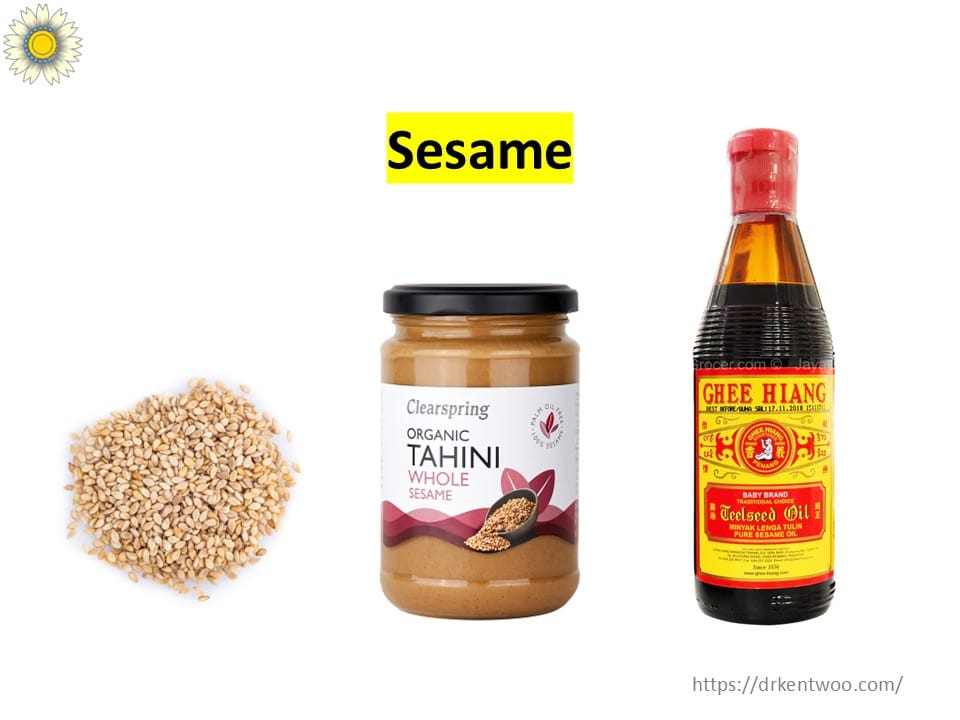Sesame Allergy: Foods to Avoid, Hidden Risks & Safety Tips

A sesame allergy is a common food allergy that can cause mild to severe reactions, including anaphylaxis. Sesame is found in many foods, especially in Middle Eastern, Asian, and vegetarian cuisine, making it important to read ingredient labels carefully.
What is a Sesame Allergy?
Sesame allergy occurs when the immune system mistakenly identifies proteins in sesame as harmful, triggering an allergic reaction. Sesame allergens remain potent even after cooking, so heat does not eliminate the risk. Some individuals may also react to sesame oil, though highly refined oils may be less allergenic.
Foods to Avoid (Contain Sesame)
If you have a sesame allergy, avoid foods that contain:
- Anything with the word “sesame” (e.g., sesame seeds, sesame oil)
- Anjonjoli
- Benne / Benne seed
- Gingelly / Gingelly oil
- Gomasio (sesame salt)
- Falafel
- Falafel vegetable burgers
- Halvah
- Hummus
- Seed paste
- Sesamol
- Sesemolina
- Sesamum indicum (scientific name for sesame)
- Sim sim / Simsin
- Tahini (Tehina)
- Til / Teel
- Turkish cake
Common Foods That May Contain Sesame
Sesame is frequently used in:
- Appetizers (e.g., hummus, dips)
- Asian cuisine (e.g., sushi, stir-fries, sesame chicken, sesame oil)
- Biscuits
- Baked goods (bagels, bread, buns, rolls, pastries)
- Candy (e.g., halvah, certain chocolate bars)
- Chutneys
- Confection bars
- Crackers
- Gluten-free foods (often use sesame as a replacement)
- Middle Eastern cuisine (e.g., tahini, za’atar seasoning)
- Muesli and granola
- Processed meats (sausages, deli meats)
- Risotto
- Sauces (e.g., salad dressings, Asian sauces)
- Sausages
- Snack foods (trail mix, granola bars, protein bars, pita chips)
- Veggie burgers and plant-based meats
- Vegetable oils (blends may contain sesame oil)
Hidden Sources of Sesame (May Contain Sesame Allergens)
- Natural flavoring and artificial flavoring
- Spice blends (za’atar, dukkah, some curry powders)
- Vegetable oil blends (may contain sesame oil)
- Bread crumbs and seasoned coatings
- Pre-packaged soups and sauces
- Energy bars and protein powders
Managing a Sesame Allergy
- Read food labels carefully. Sesame is sometimes hidden in spice blends, sauces, and processed foods.
- Be cautious when dining out. Sesame is common in Middle Eastern, Asian, and vegetarian foods.
- Avoid cross-contamination. Even small traces of sesame can trigger reactions.
- Carry an epinephrine auto-injector (EpiPen). Sesame allergy reactions can be severe.
- Check personal care products. Some lotions, shampoos, and cosmetics contain sesame oil.
- Consult an Allergist/Immunologist. Allergy testing can confirm your sensitivity and help with management.
FAQ: Sesame Allergy
1. Can sesame oil cause an allergic reaction?
Yes, but it depends on the type. Cold-pressed or unrefined sesame oil contains allergenic proteins and can trigger reactions. Highly refined sesame oil may be less allergenic, but check with your allergist before consuming it.
2. Is sesame listed as an allergen on food labels?
Yes, in many countries (including the U.S., Canada, and the EU), sesame must be declared on ingredient lists. However, in some places, it may be hidden under terms like “spices” or “natural flavoring.”
3. Can people with sesame allergies eat other seeds?
Not always. Some people allergic to sesame may also react to poppy seeds, sunflower seeds, or flaxseeds due to cross-reactivity. Speak to an Allergist/Immunologist to determine your specific allergies.
4. Can sesame allergy develop later in life?
Yes. Like peanut and tree nut allergies, sesame allergy can develop at any age and is often lifelong.
5. What should I do if I accidentally eat sesame?
- Mild symptoms (hives, stomach pain): Take an antihistamine.
- Severe symptoms (anaphylaxis): Use an EpiPen immediately and seek emergency medical help.
Conclusion
Sesame allergy is increasingly common and requires strict avoidance of all sesame-containing foods and products. Because sesame is used in many cuisines and processed foods, careful label reading and Allergist/Immunologist guidance are essential. With proper precautions, individuals with sesame allergies can manage their diet safely.
The Allergy Immunology Clinic is here to help you with your food allergy.




